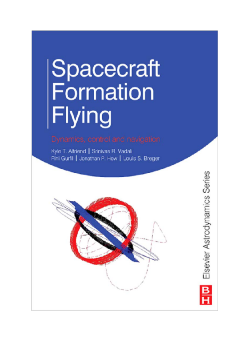
BOOK
Spacecraft Formation Flying
Kyle Alfriend | Srinivas Rao Vadali | Pini Gurfil | Jonathan How | Louis Breger
(2009)
Additional Information
Book Details
Abstract
Space agencies are now realizing that much of what has previously been achieved using hugely complex and costly single platform projects—large unmanned and manned satellites (including the present International Space Station)—can be replaced by a number of smaller satellites networked together. The key challenge of this approach, namely ensuring the proper formation flying of multiple craft, is the topic of this second volume in Elsevier’s Astrodynamics Series, Spacecraft Formation Flying: Dynamics, control and navigation.
In this unique text, authors Alfriend et al. provide a coherent discussion of spacecraft relative motion, both in the unperturbed and perturbed settings, explain the main control approaches for regulating relative satellite dynamics, using both impulsive and continuous maneuvers, and present the main constituents required for relative navigation. The early chapters provide a foundation upon which later discussions are built, making this a complete, standalone offering.
Intended for graduate students, professors and academic researchers in the fields of aerospace and mechanical engineering, mathematics, astronomy and astrophysics, Spacecraft Formation Flying is a technical yet accessible, forward-thinking guide to this critical area of astrodynamics.
- The first book dedicated to spacecraft formation flying, written by leading researchers and professors in the field
- Develops the theory from an astrodynamical viewpoint, emphasizing modeling, control and navigation of formation flying satellites on Earth orbits
- Examples used to illustrate the main developments, with a sample simulation of a formation flying mission included to illustrate high fidelity modeling, control and relative navigation
